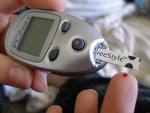New Studies: Regular Blood Sugar Testing Does Not Lead To Improved Control Of The Condition
 You’re doing yourselves more harm than good by testing your own blood sugar levels, if you are suffering from type 2 diabetes, say a series of studies published in the British Medical Journal and its online issue at BMJ.com.
You’re doing yourselves more harm than good by testing your own blood sugar levels, if you are suffering from type 2 diabetes, say a series of studies published in the British Medical Journal and its online issue at BMJ.com.
The researchers found that thousands of people with type 2 diabetes could be doing themselves more harm than good by testing their own blood sugar levels. They found that patients who self-test are more likely to be anxious and depressed than those who do not. They articulated that regular testing does not lead to improved control of the condition.
One study found that patients who check their blood sugar levels at home are more likely to be anxious and depressed than those who do not. Another study suggested that the NHS was wasting more than £100 million a year on type 2 diabetics self-testing. The studies concluded that regular testing does not lead to improved control of the condition.
Year-long study conducted by Dr Maurice O`kane and colleagues from the University of Ulster showed that self-testing made no difference in the number of hypoglycaemia attacks -- in which blood sugar falls so low that the brain function becomes affected -- or how effectively glucose levels were controlled. The researchers found that the patients in the self-monitoring group reported higher levels of depression and anxiety.
In a separate study, Dr Judit Simon and colleagues from Oxford University said the extra cost of self-monitoring was unlikely to provide patients with significant health benefits over their lifetime.